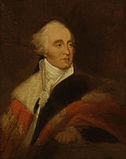
The president pro tempore of the United States Senate is the second-highest-ranking official of the United States Senate, after the vice president. According to Article One, Section Three of the United States Constitution, the vice president of the United States is the president of the Senate, and the Senate must choose a president pro tempore to act in the vice president's absence.

William Pitt was a British statesman, the youngest and last prime minister of Great Britain from 1783 until the Acts of Union 1800, and then first prime minister of the United Kingdom from January 1801. He left office in March 1801, but served as prime minister again from 1804 until his death in 1806. He was also Chancellor of the Exchequer for all of his time as prime minister. He is known as "Pitt the Younger" to distinguish him from his father, William Pitt the Elder, who had also previously served as prime minister.

George Grenville was a British Whig statesman who rose to the position of Prime Minister of Great Britain, during the early reign of the young George III. He served for only two years (1763-1765), and attempted to solve the problem of the massive debt resulting from the Seven Years' War. He instituted a series of measures to increase revenue to the crown, including new taxes and enforcement of collection, and sought to bring the North American colonies under tighter crown control.

Henry Addington, 1st Viscount Sidmouth, was a British Tory statesman who served as prime minister of the United Kingdom from 1801 to 1804 and as Speaker of the House of Commons from 1789 to 1801.

William Wyndham Grenville, 1st Baron Grenville, was a British Pittite Tory politician who served as Prime Minister of the United Kingdom from 1806 to 1807, but was a supporter of the Whigs for the duration of the Napoleonic Wars. As prime minister, his most significant achievement was the abolition of the slave trade in 1807. However, his government failed to either make peace with France or to accomplish Catholic emancipation and it was dismissed in the same year.
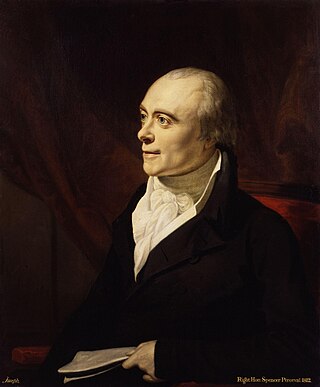
Spencer Perceval was a British statesman and barrister who served as Prime Minister of the United Kingdom from October 1809 until his assassination in May 1812. He was the only British prime minister to have been assassinated, and the only solicitor-general or attorney-general to have become prime minister.

The Speaker of the House of Commons is the presiding officer of the House of Commons, the lower house and primary chamber of the Parliament of the United Kingdom. The current speaker, Sir Lindsay Hoyle, was elected Speaker on 4 November 2019, following the retirement of John Bercow. Hoyle began his first full parliamentary term in the role on 17 December 2019, having been unanimously re-elected after the 2019 general election.

The 3rd Canadian Parliament was in session from March 26, 1874, until August 17, 1878. The membership was set by the 1874 federal election on January 22, 1874. It was dissolved prior to the 1878 election.

Robert Ward, or from 1828 Robert Plumer Ward, was an English barrister, politician, and novelist. George Canning said that his law books were as pleasant as novels, and his novels as dull as law books.
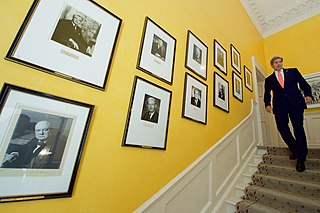
The article lists the records of prime ministers of the United Kingdom since 1721.

Devizes was a constituency in Wiltshire, England, most recently represented in the House of Commons of the UK Parliament since 2019 by Danny Kruger, a Conservative.

George Legge, 3rd Earl of Dartmouth KG, PC, FRS, styled Viscount Lewisham until 1801, was a British politician who sat in the House of Commons from 1778 to 1784.

George Tierney PC was an Irish Whig politician. For much of his career he was in opposition to the governments of William Pitt and Lord Liverpool. From 1818 to 1821 he was Leader of the Opposition in the House of Commons.

Charles Wolfran Cornwall was a British politician who sat in the House of Commons from 1768 to 1789. He was Speaker of the House of Commons from 1780 to 1789.
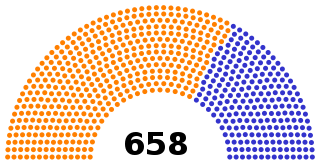
The 1806 United Kingdom general election was the election of members to the 3rd Parliament of the United Kingdom. This was the second general election to be held after the Union of Great Britain and Ireland.
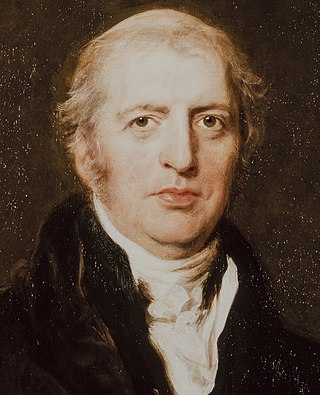
The 1812 United Kingdom general election was the fourth general election to be held after the Union of Great Britain and Ireland.
Buckinghamshire is a former United Kingdom Parliamentary constituency. It was a constituency of the House of Commons of the Parliament of England then of the Parliament of Great Britain from 1707 to 1800 and of the Parliament of the United Kingdom from 1801 to 1885.

John Hatsell was an English civil servant, clerk of the House of Commons, and an authority on parliamentary procedure.

The January 1789 election of the Speaker of the House of Commons occurred on 5 January 1789.

